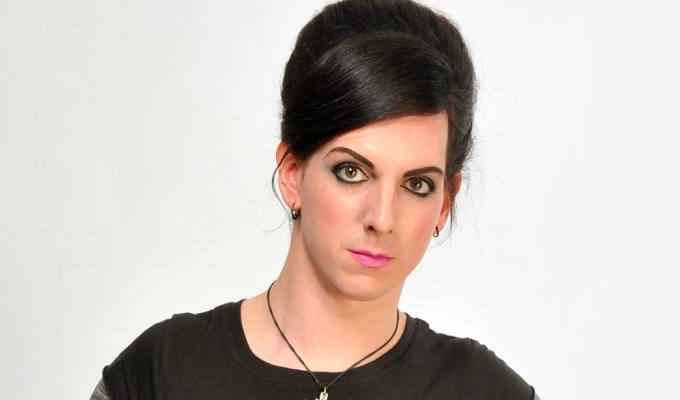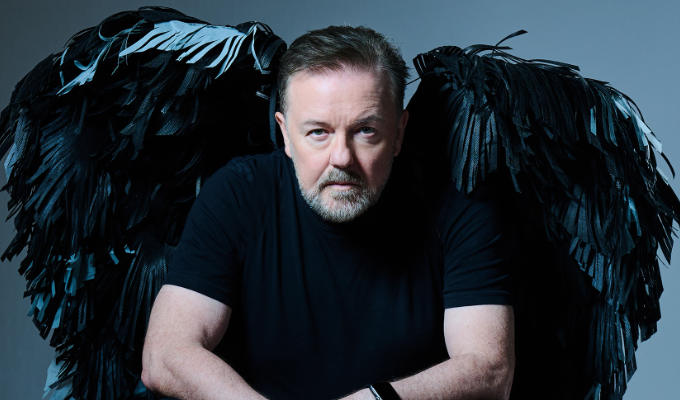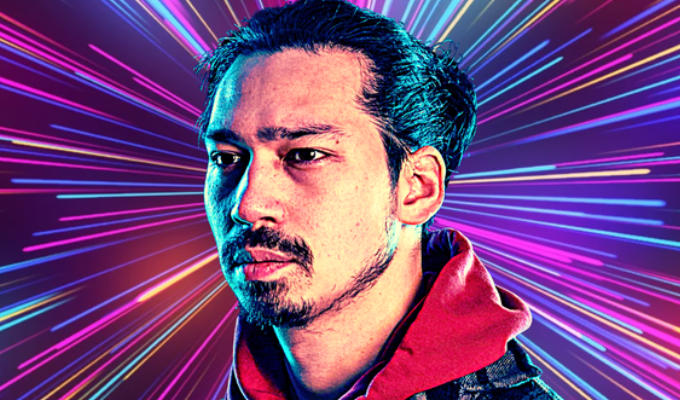
'It’s me against the world now'
Jay Richardson meets Jim Davidson
When black comic Matt Blaize first met Jim Davidson, he told him: ‘Every time you were on TV, I would dread going to school the next day because my life would be a fucking misery, you going on stage and doing fucking Chalky and all these darkie jokes. I knew I’d get it in the ear for the first hour in the playground. So I fucking hate you. And I don’t think you realise the damage you did.’
Two years on from that night in 2005 at Southend’s Cliff Pavilion, Blaize took revenge in Taxi For The Comedian, a short film that began screening at film festivals. Incorporating verbatim lines from his two-hour conversation with Davidson, it starred Toby Foster as Jim, a cocksure, racist comic, belittling his black driver before dying embarrassingly onstage.
Six years on, and incredibly, Blaize and Davidson are once again rehashing lines from that original encounter in Davidson’s new play, Stand Up And Be Counted, exploring the generation clash between so-called old school and alternative comedians.
Predominantly set in a single dressing room at an Aids benefit with a largely gay audience, Davidson is Eddie Pierce, ‘a middle-aged, old fashioned bigoted comic’, while Blaize is his ‘nemesis’ Earl T Richards, ‘young, politically correct, handsome, hysterical … and black!”’
Davidson claims he’s blown up Pierce’s bigotry to Bernard Manning levels – ‘he didn’t think that jokes caused offence ... whereas I know and can choose to do it if I wish’, while Richards, written with Blaize in mind, is a more ‘militant’ incarnation of the younger comic. Intriguingly, they’ll be writing their own stand-up sets for the play’s finale and are currently engaged in a series of low-key dates in comedy clubs together to prepare. Exaggerated or not, audiences will be able to compare their different styles of comedy directly.
Yet why are they doing it? Blaize evokes Deliverance when he disparages elements of Davidson’s fanbase. Having supported Davidson before – and ‘struggled’ according to the older comic – Blaize has continued to ‘say shit you should never say to a Jim Davidson audience. I talk about racism, black people being in the British Army, jingoism, nationalism ...’
Meanwhile, Davidson remains for many the embodiment of sexist, racist, homophobic and disablist comedy. He maintains he can’t fathom Blaize’s need to “restrict” himself, to channel his humour away from being politically incorrect.
‘The idea is to push the line of offence,’ says the 57-year-old, who once cancelled a gig in Plymouth so as not to be accused of picking on wheelchair users in the front row. 'I've always made a beeline to speak to the disabled people in the corner, the guy with the cerebral palsy, I’ll go up and press his button and chat to him. Not to take the piss, just to have a one-to-one. And you can feel the audience go “fucking hell’”. It’s a bit out of their comfort zone.
‘Make the victim laugh too, make them genuinely laugh, otherwise you’ve got it wrong, you’re picking on someone, you’re insulting people simply for your own prejudices.
‘I always thought Chalky was done with charm, maybe I’m wrong. That was my intention, that Chalky was a loveable character for everybody, otherwise I’d have just said, “there was this black bastard walking along”. I tried to make this little funny person.’
Pragmatically, they’re touring the play because five-times-married tax exile Davidson couldn’t afford to tour Sinderella 3, his latest adult pantomime. Nor could Bradley Walsh and Junior Simpson be persuaded to play the leads, as Davidson envisaged.
But they’re also doing it because the script, written by Davidson in Dubai – alongside a comedy about Alzheimer’s for Ronnie Corbett, which their shared manager felt was too long for the diminutive 80-year-old to remember; and a novel about The Commodores playing Barbados in 1978, featuring a black and white comedy duo named Coffee and Cream – is intensely personal and challenges the orthodoxies of contemporary stand-up that frustrate both men.
Prominent among these is the knowing irony employed by the likes of Jimmy Carr and Al Murray to Couch ostensibly offensive jokes in quotation marks, a middle-class, elitist ruse they feel is denied to working-class comics. ‘Micky Flanagan would have been jumped on for telling smelly gypsy jokes far quicker than Jimmy Carr,’ fumes Blaize.
Given this confrontational tone, when Davidson suggests the play might be an ‘apology for my lurid comedy past’ it’s something of a disappointment.
Blaize admits that he’s ‘showing a more vulnerable, more human side now. He’s made himself the target of most of the jokes and surprised me more than anyone has ever surprised me. The best thing about this play is that you wouldn’t believe Jim Davidson wrote it.’
But although old-school act Pierce gets ‘both barrels’, ‘no one comes out of it unscathed,’ affirms Davidson. ‘It’ll be interesting for people to know about the great divide between mainstream comedy and what’s now the alternative,’ he muses. “’It’s not even just mainstream comedians, it’s me against the world now basically. No one has a go at Jimmy Tarbuck do they?’
Filling out the play’s cast is Eddie’s long-suffering wife and manager Suzie (played by Clare Kissane and based on Cheryl Barrymore), Rachel Barrington as a television starlet and Lloyd Hollett as gay icon Billy Simpson. ‘I’ve told him don’t play gay backstage but be Alan Carr onstage,’ Davidson says.
Davidson’s TV comeback foundered in 2007 when he quit reality show Hell’s Kitchen under a cloud following homophobic remarks he made towards former Big Brother contestant Brian Dowling. In 2005, he camped it up shamelessly in the film Colour Me Kubrick with John Malkovich – ‘my gay Japanese friend told me to play it straight, which is what I set out to do, but then of course me and Malkovich had a gay-up contest’ he sighs – and he reveals he was recently confronted by Kevin Bridges for deriding Paul Sinha as an ‘Indian poof’.
He responds that Sinha had previously labelled himself in that way. The concept of own race or sexuality exoneration comedy is one that puzzles Davidson, who questions why it’s acceptable for The Kumars At No. 42 to be performed by Asian actors and not white actors. Nevertheless, it’s a concept that Stand Up And Be Counted explores. Both Richards and Simpson have insecurities about the way they exploit their skin colour and sexuality respectively. And for all that Davidson is bewildered by other comics’ motivations, he’s an otherwise keen observer. In the course of our interview, he delivers uncanny Manning, Sam Kinison, Robin Williams, Ricky Gervais and Tommy Cooper impressions.
More so than his sanguine, self-deprecating co-star, who happily admits: ‘I ain’t got a career anymore, I’m beyond all that,’ Blaize bristles when you question the wisdom of his involvement.
‘I don’t have to justify anything, though that’s the general feeling I’m getting from my friends who are comics,’ he says. ‘I like and believe in the play. Jim Davidson the man you can take issue with. He’s big enough and ugly enough to defend himself. That isn’t my job. We’ve got a relationship of total honesty, total integrity. And it’s rare that I’ve had that with anyone in my life. There’s no bullshit between us.’
He recalls an anti-war protest gig he performed in at the Bloomsbury Theatre in London. Headlined by Michael Moore and featuring Mark Steel, Mark Thomas, Rob Newman, Natalie Haynes and ‘a whole bunch of left-wing liberals – all you had to say was Tony Blair’s a cunt and you’d get a standing ovation for two minutes.
‘There’s no virtue in preaching to the converted. You want to test yourself, not by saying edgy things to a beautiful comedy audience in Covent Garden. Can you say it to a bunch of hicks in the sticks somewhere? That’s what counts.’
- Stand Up And Be Counted is touring from February 24. Click here for dates
Published: 31 Jan 2011






